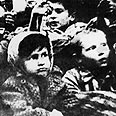
Children at Auschwitz death camp
צילום: אי פי איי
Germany opens Holocaust archives
Country agrees to open Nazi-era archives that contain some 50 million documents. Move demonstrates Germany had faced its responsibility for that chapter in history, US Holocaust Museum official says
After 60 years, the German government has agreed to open up one of the largest archives dating from the Nazi-era that contains approximately 50 million documents.
Stored in the German town of Bad Arolsen, the files reveal the fates of 17 million people subjected to forced labor, medical experimentation, and execution in concentration camps during the Holocaust. Previously, only select relatives of the people listed in these files were granted access to the archives, and the information disclosed was severely restricted, often taking years to emerge.
Yesterday, the 11 nations that share custody of the archives that take up 27 kilometers of storage space agreed to grant full access to researchers. Understandably, German representatives were concerned that handing over this information to the public would break the confidentiality of the individuals listed in the files. The feeling of many Holocaust researchers who have been pressurizing the German government to open up this archive for years has been that Germany was reluctant to let the world gawk at further proof of the atrocities that the Nazi's committed.
"The papers may disclose, for instance, who was treated for lice at which camp, what medical experiments were conducted on particular prisoners, and which inmates were tempted to collaborate with their captors.´ David Stout observed in the New York Times.
The World Jewish Congress, whilst wholeheartedly supporting the decision to open the archives, noted that as part of the agreement, "provisions would be taken to ensure the dignity of individuals covered in the files".
Stout reported that Arthur Berger, the United States Holocaust Museum's senior adviser on external affairs commented that this move had demonstrated that Germany had faced its responsibility towards that chapter in its history and that researchers will find this information invaluable. But even more so, relatives deserved to know what happened to their families.
Paul Shapiro, director of advanced Holocaust studies at the US Holocaust museum, also hopes that the paper trail may reveal some of the names of individuals who were responsible for carrying out these orders that for the sake of justice should be brought to light.










